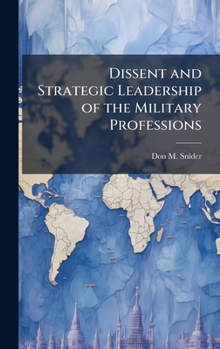Dissent and Strategic Leadership of the Military Professions
Select Format
Select Condition 
Book Overview
One of the central difficulties to a right understanding of American civil-military relations is the nature of the U.S. military. Are our armed forces just obedient bureaucracies like most of the Executive branch, or are they vocational professions granted significant autonomy and a unique role in these relationships because of their expert knowledge and their expertise to apply it in the defense of America? To large measure, the answer to this question should determine the behavior of the strategic leaders of these professions, including the uncommon behavior of public dissent. Using the "Revolt of the Generals" in 2006 as stimulus, the author develops from the study of military professions the critical trust relationships that should have informed their individual decisions to dissent. After doing so, he makes recommendations for the restoration of the professions' ethic in this critical area of behavior by the senior officers who are the professions' strategic leaders.
This work has been selected by scholars as being culturally important, and is part of the knowledge base of civilization as we know it. This work was reproduced from the original artifact, and remains as true to the original work as possible. Therefore, you will see the original copyright references, library stamps (as most of these works have been housed in our most important libraries around the world), and other notations in the work.
This work is in the public domain in the United States of America, and possibly other nations. Within the United States, you may freely copy and distribute this work, as no entity (individual or corporate) has a copyright on the body of the work.
As a reproduction of a historical artifact, this work may contain missing or blurred pages, poor pictures, errant marks, etc. Scholars believe, and we concur, that this work is important enough to be preserved, reproduced, and made generally available to the public. We appreciate your support of the preservation process, and thank you for being an important part of keeping this knowledge alive and relevant.
Related Subjects
Education Education & Reference History Political Science Politics & Social Sciences




